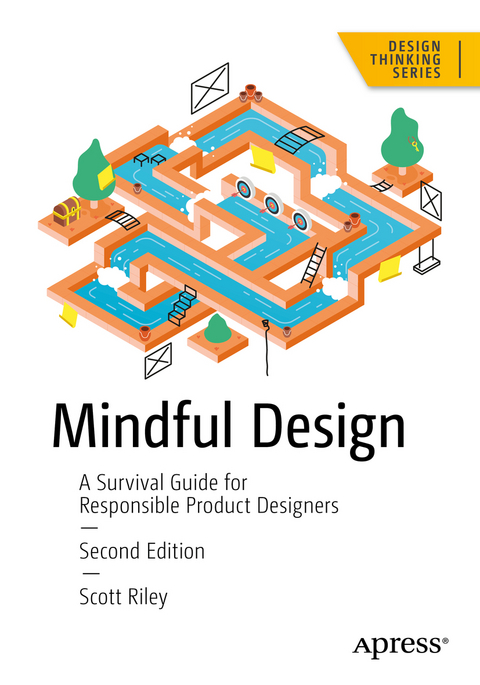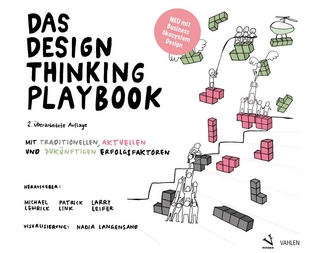
Mindful Design
A Survival Guide for Responsible Product Designers
Seiten
2024
|
Second Edition
Apress (Verlag)
979-8-8688-0142-6 (ISBN)
Apress (Verlag)
979-8-8688-0142-6 (ISBN)
Learn to create seamless designs backed by a responsible understanding of the human mind. This new edition is fully updated and reworked to employ a realistic, challenging, and practical approach to interface design, presenting state of the art scientific studies in behavioral sciences, interface design and the psychology of design. All with modern, up-to-date examples and screenshots. The practical portion of this edition has been completely reworked, giving you the chance to follow along with a real, proven design process that has produced several successful products imbued with the principles of mindful, responsible design.
You'll examine how human behavior can be used to integrate your product design into lifestyle, rather than interrupt it, and make decisions for the good of those that are using your product. You will also learn about the neurological aspects and limitations of human vision and perception; about our attachment to harmony and dissonance; and about our brain’s propensity towards pattern recognition and how we perceive the world around us. In the second half of the book, you’ll follow along with the key phases of a design project, implementing what you have learned in an end-to-end, practical setting.
Design is a responsibility, but not enough designers understand the human mind or the process of thought. Mindful Design, Second Edition introduces the areas of brain science that matter to designers, and passionately explains how those areas affect each human’s day-to-day experiences with products and interfaces, providing a battle-tested toolkit to help you make responsible design decisions.
What You'll Learn
Review how attention and distraction work and the cost of attentional switching
Use Gestalt principles to communicate visual grouping
Ensure your underlying models make sense to your audience
Use time, progression, and transition to create a composition
Carefully examine controlling behavior through reductionist and behaviorist motivation concepts
Apply the theoretical knowledge to practical, mindful interface design
Who This Book Is For
The primary audience for this book is professional designers who wish to learn more about the human mind and how to apply that to their work. The book is also useful for design-focused product owners and startup founders who wish to apply ethical thinking to a team, or when bootstrapping their products. The secondary audience is design students who are either studying a ‘traditional’ visual design course, or a UX/interaction design course who have a desire to learn how they might be able to apply mindful design to their early careers. Finally, a tertiary audience for this book would be tutors involved in teaching design, or peripheral, courses who may wish to incorporate its teachings into their lectures, workshops or seminars.
You'll examine how human behavior can be used to integrate your product design into lifestyle, rather than interrupt it, and make decisions for the good of those that are using your product. You will also learn about the neurological aspects and limitations of human vision and perception; about our attachment to harmony and dissonance; and about our brain’s propensity towards pattern recognition and how we perceive the world around us. In the second half of the book, you’ll follow along with the key phases of a design project, implementing what you have learned in an end-to-end, practical setting.
Design is a responsibility, but not enough designers understand the human mind or the process of thought. Mindful Design, Second Edition introduces the areas of brain science that matter to designers, and passionately explains how those areas affect each human’s day-to-day experiences with products and interfaces, providing a battle-tested toolkit to help you make responsible design decisions.
What You'll Learn
Review how attention and distraction work and the cost of attentional switching
Use Gestalt principles to communicate visual grouping
Ensure your underlying models make sense to your audience
Use time, progression, and transition to create a composition
Carefully examine controlling behavior through reductionist and behaviorist motivation concepts
Apply the theoretical knowledge to practical, mindful interface design
Who This Book Is For
The primary audience for this book is professional designers who wish to learn more about the human mind and how to apply that to their work. The book is also useful for design-focused product owners and startup founders who wish to apply ethical thinking to a team, or when bootstrapping their products. The secondary audience is design students who are either studying a ‘traditional’ visual design course, or a UX/interaction design course who have a desire to learn how they might be able to apply mindful design to their early careers. Finally, a tertiary audience for this book would be tutors involved in teaching design, or peripheral, courses who may wish to incorporate its teachings into their lectures, workshops or seminars.
Scott Riley is an independent designer specializing in interface and interaction design. He has written extensively and spoken at conferences around the world on the intersection of cognitive science and design. You can find details of all his work on his website, scott.is.
Part 1: The Theory.- 1: Attention and Distraction.-2: Vision, Perception, and Aesthetics.- 3: Learning and Memory.- 4: Expectation and Surprise.- 5: Reward and Motivation.- Part 2: The Project.- 6: The Setup.- 7: Researching a Problem Space.- 8: Problem and Solution Definition.- 9: Execution and Evaluation.- 10: Responsible Implementation.
| Erscheinungsdatum | 05.04.2024 |
|---|---|
| Reihe/Serie | Design Thinking |
| Zusatzinfo | 101 Illustrations, color; 3 Illustrations, black and white; XXII, 342 p. 104 illus., 101 illus. in color. |
| Verlagsort | Berlin |
| Sprache | englisch |
| Maße | 178 x 254 mm |
| Themenwelt | Informatik ► Software Entwicklung ► User Interfaces (HCI) |
| Mathematik / Informatik ► Informatik ► Web / Internet | |
| Sozialwissenschaften ► Soziologie ► Empirische Sozialforschung | |
| Schlagworte | Cognitive Neuroscience • dopamine • emotional design • ethical design • habit-forming design • Hooked • Product design • psychology of design • User-Centered Design |
| ISBN-13 | 979-8-8688-0142-6 / 9798868801426 |
| Zustand | Neuware |
| Informationen gemäß Produktsicherheitsverordnung (GPSR) | |
| Haben Sie eine Frage zum Produkt? |
Mehr entdecken
aus dem Bereich
aus dem Bereich
Mit traditionellen, aktuellen und zukünftigen Erfolgsfaktoren
Buch | Softcover (2018)
Franz Vahlen (Verlag)
29,80 €
Aus- und Weiterbildung nach iSAQB-Standard zum Certified Professional …
Buch | Hardcover (2023)
dpunkt Verlag
34,90 €
Wissensverarbeitung - Neuronale Netze
Buch | Hardcover (2023)
Carl Hanser (Verlag)
34,99 €


